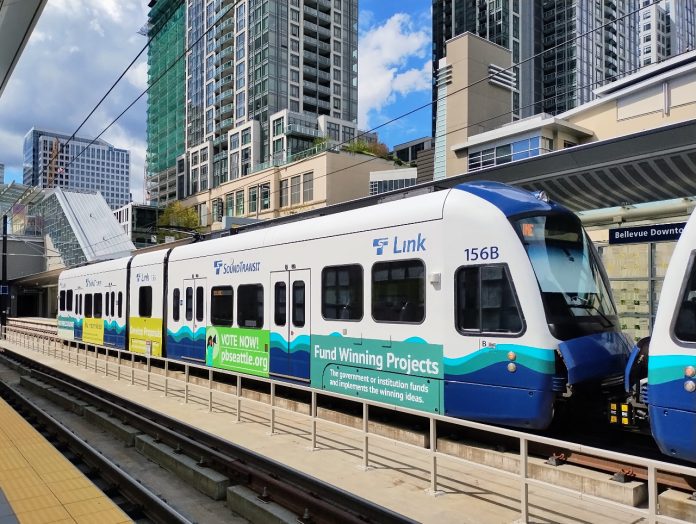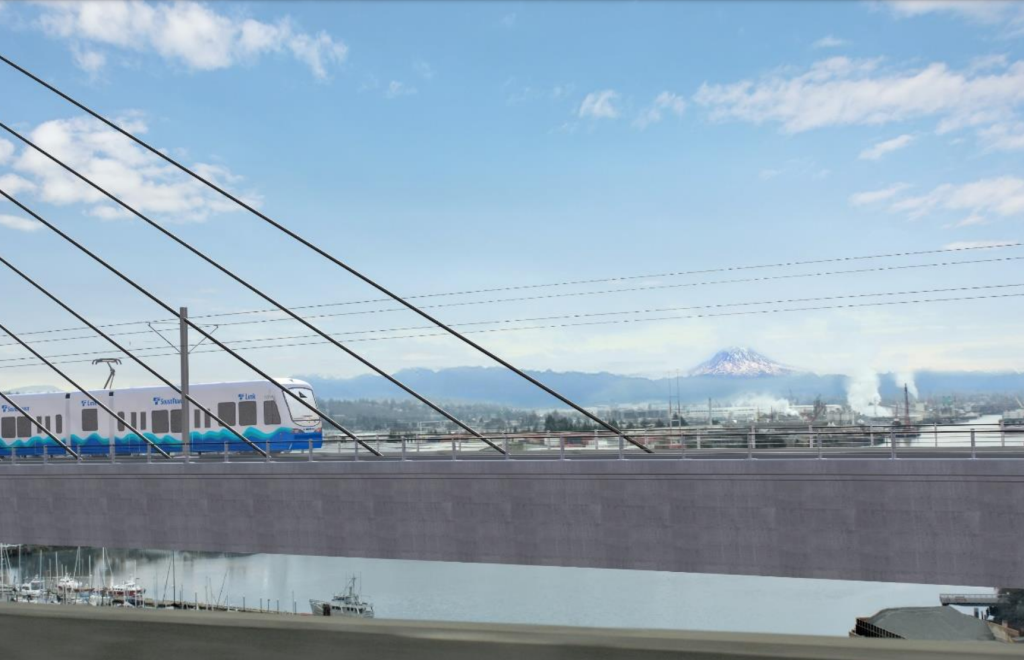
A proposal advancing through the Seattle City Council aiming to streamline permitting for Sound Transit light rail projects could be hindered by an amendment requiring additional public outreach and documentation. Put forward by District 4 Councilmember Maritza Rivera, the last-minute amendment delayed a planned vote in the council’s Land Use Committee after concerns were raised by other councilmembers.
Seattle’s land use code wasn’t designed with light rail in mind, and the code amendment package released by Mayor Bruce Harrell earlier this year attempts to make it easier for Sound Transit permits to get approved across a number of areas, everything from station design to tree removal. Without this change, the West Seattle and Ballard Link Extension light rail projects would be subjected to 19 different types of development standards across the neighborhoods where trackways and stations are planned, among other requirements.
The average permitting timeline for Seattle’s latest light rail stations averaged more than 200 days each. The goal of Harrell’s reform package is to reduce light rail permit timelines to under 100 days.

But the amendment introduced by Rivera as a “walk on” Thursday could add time and expense, adding a whole new framework around community engagement when it comes to Sound Transit permitting specifically.
It would require Sound Transit to submit a Community Outreach Plan (COP) before even being able to submit a permit application, of which dozens are expected. According to the text, which as of Friday morning still had not been posted to the council’s website, the COP “shall include a list of residents, businesses, and other impacted stakeholders anticipated to be targeted for public outreach; methods of communication (including print, digital, and in person); purpose and objectives for the outreach; and project information anticipated to be shared during the outreach.”
When submitting each permit application, Sound Transit would be required to document compliance with that plan, “including a list of community members and stakeholders contacted; how community feedback was incorporated; and, as applicable, an explanation of why feedback was not incorporated.” Finally, the City of Seattle would need to “summarize the outreach and explain how the decision addresses public comment, where feasible” when issuing a permit decision.
That’s not all. It would also require that the city ask for a construction management plan from Sound Transit, rather than simply allowing the city to request one where it’s warranted, and stipulate that plan should incorporate public comment incorporated by the Community Outreach Plan. It also requires that the Director of the Seattle Department of Construction and Inspections (SDCI) specifically broadcast the fact that a permit can be appealed to King County Superior Court, a process that could delay permit issuance even further.
Rivera framed her amendment as a “friendly” one that would simply codify what’s already being done now, but whether that’s actually the case seems far from clear. The City’s Sound Transit team, which has been shepherding this code package through council, wasn’t informed about the amendment until it dropped and scrambled to understand its implications as councilmembers discussed it.
“Not currently in the code, and not in the mayor’s proposal, would be a new requirement for a Community Outreach Plan,” Council Central Staff Analyst Ketil Freeman said. “So a new component to this is that there is a body of work that would need to precede a permit application.”
“I think that is something that I’m not sure what that would look like, and that is something that is not required on other permits right now,” Sara Maxana, the city’s Sound Transit Program Director, said of the provision requiring final city permits to summarize public feedback and how it was responded to. “So trying to understand, is this something that we’re applying to Sound Transit, that we don’t apply to other projects? Is that different?”
A vote on the amendment likely would have taken place Thursday if not for concerns raised by Councilmembers Dan Strauss and Alexis Mercedes Rinck, around the potential impact of the changes and the lack of time available to review them. Instead, committee chair Mark Solomon decided to postpone the vote an additional week.
“I certainly hear the spirit of the amendment, and I, in good faith, need to understand the full impact of what it means for cost and time for these projects, again, because of this underlying goal of what we’re trying to do here,” Rinck said. “The public has voted to approve these projects, has been paying for them for years, and we shouldn’t force them to keep paying while progress is stalled.”

Councilmember Cathy Moore, siding with Rivera, told her colleagues that she was so comfortable with the amendment that she wouldn’t vote for the bill to advance out of committee without it. “I’m not at all concerned that this is going to create unnecessary delay or unnecessary additional cost,” Moore said. “Even if it adds a little bit [of] additional cost, that’s what we need to incur, because we are making significant changes, and the public has the right to be engaged.”
Rivera, telling her colleagues that she was “stunned” by the concerns raised by her last-minute proposal, said it wasn’t intended to create delays.
“I’m just trying to mitigate for the city’s responsibility here in terms of of having to give that permitting and make sure that this is all done in a way that we’re able to show our work to the public,” she said. “If showing our work is a heavy lift and a problem, then I have bigger concerns than I had actually coming into this amendment, that was not meant to stall the project or to create an obstacle.”
Whatever the legislative intent, establishing a whole new host of paperwork requirements and outreach hurdles seems sure to delay permitting and ultimately light rail delivery, especially given the inherent challenge of juggling the 89 permits that make up West Seattle Link at the same time.
The council’s Land Use Committee is set to take up the amendment ahead of a final vote on the proposal on Wednesday June 4 at 2pm.
“This bill is incredibly important, not necessarily for cost savings, but to ensure that we are not cost drivers. The most important thing for everyone to take away is the most expensive cost driver is delay,” Strauss said, referencing a nearby city that famously added significant local burdens as part of approving their light rail stations. “I just really hope, colleagues, that we’re not becoming the next Bellevue in regards to Sound Transit.”
Ryan Packer has been writing for The Urbanist since 2015, and currently reports full-time as Contributing Editor. Their beats are transportation, land use, public space, traffic safety, and obscure community meetings. Packer has also reported for other regional outlets including BikePortland, Seattle Met, and PubliCola. They live in the Capitol Hill neighborhood of Seattle.

